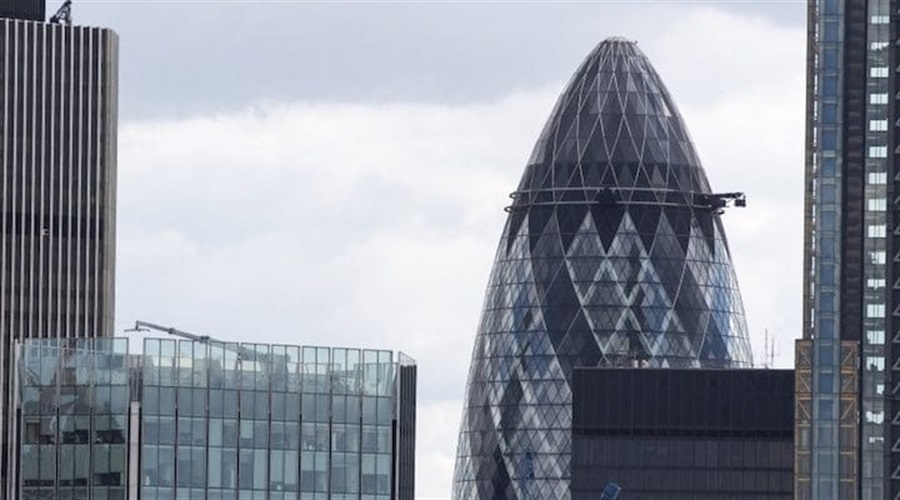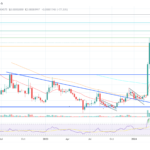[ad_1]
Equals (AIM: EQLS), a provider of payment solutions to SMEs, has entered into a conditional agreement for the Acquisition of Roqqett Limited, an open banking payments platform, for a total consideration of up to £2.25 million.
Announced on Monday, Equals agreed to acquire the entire issued and to be issued share capital of Roqqett. However, the deal is now subject to the approval of the Financial Conduct Authority (FCA
Financial Conduct Authority (FCA)
The Financial Conduct Authority (FCA) is the largest financial regulator for all financial markets in the United Kingdom (UK).The UK regulator is responsible for the conduct of firms authorized under the Financial Services and Markets Act 2000. Moreover, the FCA is also responsible for the regulation of behavior in retail and wholesale financial markets, supervision of the trading infrastructure that supports those markets, and the prudential regulation of firms not regulated by the PRA. Its role includes protecting consumers, keeping the industry stable, and promoting healthy competition between financial service providers. The FCA publishes and updates a guide handbook that sets out the rules, guidance, and provisions made by the FCA under its powers. The FCA has supervisory authorities overall financial services firms conducting regulated activities, such as offering loans, car financing deals, any consumer credit. Investment firms carrying on certain activities concerning financial instruments such as shares and bonds, the Markets in Financial Instruments Directive (MiFID) requires you to be authorized. Businesses are providing pre-paid cards or other such financial services, money transfers, E-money, and credit cards. The Financial Conduct Authority (FCA) ExplainedThe Financial Conduct Authority is responsible for all financial activities conducted in the UK or by UK citizens. Parliament gave the FCA a single strategic objective – to ensure that relevant markets function well – and three operational goals to advance, i.e. protecting consumers, integrity, and promoting competition.The FCA has been instrumental in policing the forex industry, including curbing market abuse in the form of scams, schemes, clones, etc. Recent years has seen the authority take a harder stance on investment products, including forex, contracts-for-difference (CFDs), and binary options.
The Financial Conduct Authority (FCA) is the largest financial regulator for all financial markets in the United Kingdom (UK).The UK regulator is responsible for the conduct of firms authorized under the Financial Services and Markets Act 2000. Moreover, the FCA is also responsible for the regulation of behavior in retail and wholesale financial markets, supervision of the trading infrastructure that supports those markets, and the prudential regulation of firms not regulated by the PRA. Its role includes protecting consumers, keeping the industry stable, and promoting healthy competition between financial service providers. The FCA publishes and updates a guide handbook that sets out the rules, guidance, and provisions made by the FCA under its powers. The FCA has supervisory authorities overall financial services firms conducting regulated activities, such as offering loans, car financing deals, any consumer credit. Investment firms carrying on certain activities concerning financial instruments such as shares and bonds, the Markets in Financial Instruments Directive (MiFID) requires you to be authorized. Businesses are providing pre-paid cards or other such financial services, money transfers, E-money, and credit cards. The Financial Conduct Authority (FCA) ExplainedThe Financial Conduct Authority is responsible for all financial activities conducted in the UK or by UK citizens. Parliament gave the FCA a single strategic objective – to ensure that relevant markets function well – and three operational goals to advance, i.e. protecting consumers, integrity, and promoting competition.The FCA has been instrumental in policing the forex industry, including curbing market abuse in the form of scams, schemes, clones, etc. Recent years has seen the authority take a harder stance on investment products, including forex, contracts-for-difference (CFDs), and binary options.
Read this Term).
Equals will make an initial £1 million cash payment for the acquisition consideration, followed by three deferred payments
Payments
One of the bases of mediums of exchange in the modern world, a payment constitutes the transfer of a legal currency or equivalent from one party in exchange for goods or services to another entity. The payments industry has become a fixture of modern commerce, though the players involved and means of exchange have dramatically shifted over time.In particular, a party making a payment is referred to as a payer, with the payee reflecting the individual or entity receiving the payment. Most commonly the basis of exchange involves fiat currency or legal tender, be it in the form of cash, credit or bank transfers, debit, or checks. While typically associated with cash transfers, payments can also be made in anything of perceived value, be it stock or bartering – though this is far more limited today than it has been in the past.The Largest Players in the Payments IndustryFor most individuals, the payments industry is dominated currently by card companies such as Visa or Mastercard, which facilitate the use of credit or debit expenditures. More recently, this industry has seen the rise of Peer-to-Peer (P2P) payments services, which have gained tremendous traction in Europe, the United States, and Asia, among other continents.One of the biggest parameters for payments is timing, which looms as a crucial element for execution. By this metric, consumer demand incentivizes technology that prioritizes the fastest payment execution.This can help explain the preference for debit and credit payments overtaking check or money orders, which in previous decades were much more commonly utilized. A multi-billion-dollar industry, the payments space has seen some of the most innovation and advances in recent years as companies look to push contactless technology with faster execution times.
One of the bases of mediums of exchange in the modern world, a payment constitutes the transfer of a legal currency or equivalent from one party in exchange for goods or services to another entity. The payments industry has become a fixture of modern commerce, though the players involved and means of exchange have dramatically shifted over time.In particular, a party making a payment is referred to as a payer, with the payee reflecting the individual or entity receiving the payment. Most commonly the basis of exchange involves fiat currency or legal tender, be it in the form of cash, credit or bank transfers, debit, or checks. While typically associated with cash transfers, payments can also be made in anything of perceived value, be it stock or bartering – though this is far more limited today than it has been in the past.The Largest Players in the Payments IndustryFor most individuals, the payments industry is dominated currently by card companies such as Visa or Mastercard, which facilitate the use of credit or debit expenditures. More recently, this industry has seen the rise of Peer-to-Peer (P2P) payments services, which have gained tremendous traction in Europe, the United States, and Asia, among other continents.One of the biggest parameters for payments is timing, which looms as a crucial element for execution. By this metric, consumer demand incentivizes technology that prioritizes the fastest payment execution.This can help explain the preference for debit and credit payments overtaking check or money orders, which in previous decades were much more commonly utilized. A multi-billion-dollar industry, the payments space has seen some of the most innovation and advances in recent years as companies look to push contactless technology with faster execution times.
Read this Term, one in cash of up to £0.25 million and two of £0.5 million, one in cash and the other by the issue of ordinary shares in Equals.
“Similar to the Equals Connect transaction announced in October, the transaction is made possible by the continued strong performance of the Group and our surplus cash balances,” said Equals’ CEO, Ian Strafford-Taylor.
Indeed, Equals’ revenue jumped by 84 percent in the first half of 2022, whereas the net profit came in at £0.8 million, recovering from a loss of £1.2 million in a similar period of the previous year.
Roqqett closed 2021 with a pre-tax loss of £0.57 million and an asset of £0.2 million.
A Strategic Acquisition
Roqqett was established in 2019 by Glenn Smith, a former FX Derivatives executive at UBS and Barclays. The FCA has authorized the company as an Account Information Service Provider (AISP) and Payment Initiation Service Provider (PISP). These licenses allow the company to offer a full suite of open banking services, including taking payments and financial data access.
The acquisition agreement is strategic as Equals does not hold either an AISP incense or a PISP license.
“The platform, underlying technology, and licenses that we are acquiring fit well with our stated strategy of providing payments solutions to our B2B customer base,” Strafford-Taylor added.
If materialized, the acquisition will allow Equals to offer full payment life cycle products for its corporate and enterprise customers by adding the B2B2B/C leg to the ultimate consumer. The potential features can significantly increase the offerings of Equals Money and Equals Solutions.
The Equals infrastructure will further enhance the Roqqett proposition on a stand-alone basis. Additionally, the data capabilities will allow Equals to make decisions using machine-learning technology.
Roqqett’s CEO, Glenn Smith, added: “Roqqett has developed a unique checkout experience for the rapidly growing market in open banking payments. This offering is enhanced with the addition of Equal’s capabilities in IBANs and their membership of the Faster Payments Scheme. The team at Roqqett is looking forward to working with Equals to maximise the potential for both platforms arising from this acquisition.”
Equals (AIM: EQLS), a provider of payment solutions to SMEs, has entered into a conditional agreement for the Acquisition of Roqqett Limited, an open banking payments platform, for a total consideration of up to £2.25 million.
Announced on Monday, Equals agreed to acquire the entire issued and to be issued share capital of Roqqett. However, the deal is now subject to the approval of the Financial Conduct Authority (FCA
Financial Conduct Authority (FCA)
The Financial Conduct Authority (FCA) is the largest financial regulator for all financial markets in the United Kingdom (UK).The UK regulator is responsible for the conduct of firms authorized under the Financial Services and Markets Act 2000. Moreover, the FCA is also responsible for the regulation of behavior in retail and wholesale financial markets, supervision of the trading infrastructure that supports those markets, and the prudential regulation of firms not regulated by the PRA. Its role includes protecting consumers, keeping the industry stable, and promoting healthy competition between financial service providers. The FCA publishes and updates a guide handbook that sets out the rules, guidance, and provisions made by the FCA under its powers. The FCA has supervisory authorities overall financial services firms conducting regulated activities, such as offering loans, car financing deals, any consumer credit. Investment firms carrying on certain activities concerning financial instruments such as shares and bonds, the Markets in Financial Instruments Directive (MiFID) requires you to be authorized. Businesses are providing pre-paid cards or other such financial services, money transfers, E-money, and credit cards. The Financial Conduct Authority (FCA) ExplainedThe Financial Conduct Authority is responsible for all financial activities conducted in the UK or by UK citizens. Parliament gave the FCA a single strategic objective – to ensure that relevant markets function well – and three operational goals to advance, i.e. protecting consumers, integrity, and promoting competition.The FCA has been instrumental in policing the forex industry, including curbing market abuse in the form of scams, schemes, clones, etc. Recent years has seen the authority take a harder stance on investment products, including forex, contracts-for-difference (CFDs), and binary options.
The Financial Conduct Authority (FCA) is the largest financial regulator for all financial markets in the United Kingdom (UK).The UK regulator is responsible for the conduct of firms authorized under the Financial Services and Markets Act 2000. Moreover, the FCA is also responsible for the regulation of behavior in retail and wholesale financial markets, supervision of the trading infrastructure that supports those markets, and the prudential regulation of firms not regulated by the PRA. Its role includes protecting consumers, keeping the industry stable, and promoting healthy competition between financial service providers. The FCA publishes and updates a guide handbook that sets out the rules, guidance, and provisions made by the FCA under its powers. The FCA has supervisory authorities overall financial services firms conducting regulated activities, such as offering loans, car financing deals, any consumer credit. Investment firms carrying on certain activities concerning financial instruments such as shares and bonds, the Markets in Financial Instruments Directive (MiFID) requires you to be authorized. Businesses are providing pre-paid cards or other such financial services, money transfers, E-money, and credit cards. The Financial Conduct Authority (FCA) ExplainedThe Financial Conduct Authority is responsible for all financial activities conducted in the UK or by UK citizens. Parliament gave the FCA a single strategic objective – to ensure that relevant markets function well – and three operational goals to advance, i.e. protecting consumers, integrity, and promoting competition.The FCA has been instrumental in policing the forex industry, including curbing market abuse in the form of scams, schemes, clones, etc. Recent years has seen the authority take a harder stance on investment products, including forex, contracts-for-difference (CFDs), and binary options.
Read this Term).
Equals will make an initial £1 million cash payment for the acquisition consideration, followed by three deferred payments
Payments
One of the bases of mediums of exchange in the modern world, a payment constitutes the transfer of a legal currency or equivalent from one party in exchange for goods or services to another entity. The payments industry has become a fixture of modern commerce, though the players involved and means of exchange have dramatically shifted over time.In particular, a party making a payment is referred to as a payer, with the payee reflecting the individual or entity receiving the payment. Most commonly the basis of exchange involves fiat currency or legal tender, be it in the form of cash, credit or bank transfers, debit, or checks. While typically associated with cash transfers, payments can also be made in anything of perceived value, be it stock or bartering – though this is far more limited today than it has been in the past.The Largest Players in the Payments IndustryFor most individuals, the payments industry is dominated currently by card companies such as Visa or Mastercard, which facilitate the use of credit or debit expenditures. More recently, this industry has seen the rise of Peer-to-Peer (P2P) payments services, which have gained tremendous traction in Europe, the United States, and Asia, among other continents.One of the biggest parameters for payments is timing, which looms as a crucial element for execution. By this metric, consumer demand incentivizes technology that prioritizes the fastest payment execution.This can help explain the preference for debit and credit payments overtaking check or money orders, which in previous decades were much more commonly utilized. A multi-billion-dollar industry, the payments space has seen some of the most innovation and advances in recent years as companies look to push contactless technology with faster execution times.
One of the bases of mediums of exchange in the modern world, a payment constitutes the transfer of a legal currency or equivalent from one party in exchange for goods or services to another entity. The payments industry has become a fixture of modern commerce, though the players involved and means of exchange have dramatically shifted over time.In particular, a party making a payment is referred to as a payer, with the payee reflecting the individual or entity receiving the payment. Most commonly the basis of exchange involves fiat currency or legal tender, be it in the form of cash, credit or bank transfers, debit, or checks. While typically associated with cash transfers, payments can also be made in anything of perceived value, be it stock or bartering – though this is far more limited today than it has been in the past.The Largest Players in the Payments IndustryFor most individuals, the payments industry is dominated currently by card companies such as Visa or Mastercard, which facilitate the use of credit or debit expenditures. More recently, this industry has seen the rise of Peer-to-Peer (P2P) payments services, which have gained tremendous traction in Europe, the United States, and Asia, among other continents.One of the biggest parameters for payments is timing, which looms as a crucial element for execution. By this metric, consumer demand incentivizes technology that prioritizes the fastest payment execution.This can help explain the preference for debit and credit payments overtaking check or money orders, which in previous decades were much more commonly utilized. A multi-billion-dollar industry, the payments space has seen some of the most innovation and advances in recent years as companies look to push contactless technology with faster execution times.
Read this Term, one in cash of up to £0.25 million and two of £0.5 million, one in cash and the other by the issue of ordinary shares in Equals.
“Similar to the Equals Connect transaction announced in October, the transaction is made possible by the continued strong performance of the Group and our surplus cash balances,” said Equals’ CEO, Ian Strafford-Taylor.
Indeed, Equals’ revenue jumped by 84 percent in the first half of 2022, whereas the net profit came in at £0.8 million, recovering from a loss of £1.2 million in a similar period of the previous year.
Roqqett closed 2021 with a pre-tax loss of £0.57 million and an asset of £0.2 million.
A Strategic Acquisition
Roqqett was established in 2019 by Glenn Smith, a former FX Derivatives executive at UBS and Barclays. The FCA has authorized the company as an Account Information Service Provider (AISP) and Payment Initiation Service Provider (PISP). These licenses allow the company to offer a full suite of open banking services, including taking payments and financial data access.
The acquisition agreement is strategic as Equals does not hold either an AISP incense or a PISP license.
“The platform, underlying technology, and licenses that we are acquiring fit well with our stated strategy of providing payments solutions to our B2B customer base,” Strafford-Taylor added.
If materialized, the acquisition will allow Equals to offer full payment life cycle products for its corporate and enterprise customers by adding the B2B2B/C leg to the ultimate consumer. The potential features can significantly increase the offerings of Equals Money and Equals Solutions.
The Equals infrastructure will further enhance the Roqqett proposition on a stand-alone basis. Additionally, the data capabilities will allow Equals to make decisions using machine-learning technology.
Roqqett’s CEO, Glenn Smith, added: “Roqqett has developed a unique checkout experience for the rapidly growing market in open banking payments. This offering is enhanced with the addition of Equal’s capabilities in IBANs and their membership of the Faster Payments Scheme. The team at Roqqett is looking forward to working with Equals to maximise the potential for both platforms arising from this acquisition.”
[ad_2]
Source link
My NEO Group:
– White paper My NEO Group: https://myneo.org
– Discover NEO X: https://docs.myneo.org/products/in-development/neo-x
– Disccover NEO Dash: https://myneodash.com
– Discover Banca NEO: https://bancaneo.org
– Interview of the CEO of My NEO Group, Mickael Mosse, in Forbes: https://forbesbaltics.com/en/money/article/mickael-mosse-affirms-commitment-to-redefining-online-banking-with-bancaneo






